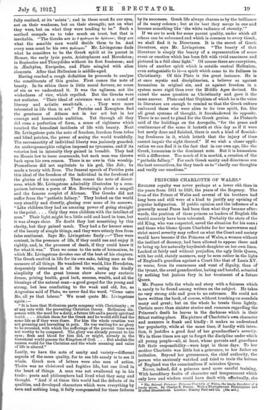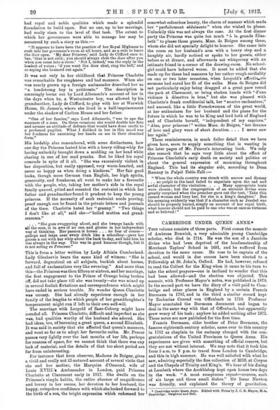PRINCESS CHARLOTTE OF WALES.*
ENGLISH royalty was never perhaps at a lower ebb than in the years from 1811 to 1820, the years of the Regency. The lives of the Prince of Wales and several of his brothers bad long been and still were of a kind to justify any uprising of popular indignation. If public opinion and the influence of a generally moral Press had been then what they became after- wards, the position of these princes as leaders of English life would scarcely have been tolerated. Probably the state of the old King, who was respected, saved the situation for his sons and those who blame Queen Charlotte for her narrowness and strict moral severity may reflect on what the Court and society' would have become if the Princess of Wales, a woman without the instinct of decency, had been allowed to appear there and to bring up her naturally hoydenish daughter on her own lines. Looked at fairly and without prejudice, the ugly little Queen, with her cold, stately manners, may be seen rather in the light of England's guardian against a Court like that of Louis XV. or worse, from its coarseness and want of dignity, than of the tyrant, the cruel grandmother, hating and hateful, actuated by nothing but jealous fury in her treatment of a future Queen.
Mr. Pearce tells the whole sad story with a fairness which is rarely to be found among writers on the subject. He takes no very strong side and goes to no extremes. He could not have written the book, of course, without touching on scandals many and great ; but on the whole he treats them lightly. Certain more than sinister stories and rumours regarding the Princess's death he leaves in the darkness which is their fittest resting-place. His picture of Charlotte's own character and manners is frank and kindly : it makes us understand her popularity, while at the same time, if hardly with inten- tion, it justifies a. good deal of her grandmother's severity. We in these times are apt to forget the discipline under which all young people—all, at least, whose parents and guardians felt their responsibility—were kept in those days. To her mother Charlotte was little but a grievance, to her father an irritation. Beyond her governesses, the chief authority, the person who anxiously watched and tried to train the heiress of England was the conscientious if mistaken Queen. Never, indeed, did a princess need more careful training, With hereditary faults of character and temperament which only love and wisdom could have dealt with effectually, she
• The Beloved Princess Princess Charlotte of Wales, the lonely Daughter of e lonely Queen. By Charles E. Pearce. With a Photogravure Frontispiece and 32 other Illustrations. London : Stanley Paul and Co. pos. net.]
had royal and noble qualities which made a splendid foundation to build upon. But no one, up to her marriage, had really risen to the level of that task. The extent to which her governesses were able to manage her may be measured by such a story as this :—
" It appears to have been the practice of her Royal Highness to rush into her governess's room at all hours, and as a rule to leave the door open. Hy dear Princess,' said Lady de Clifford once to her, 'that is not civil ; poi should always shut the door after you when you come into a room.' Not I, indeed,' was the reply in the loudest of voices ; 'if you want the door shut, ring the bell,' and so saying she bounced out again."
It was not only in her childhood that Princess Charlotte
was remarkable for roughness and bad manners. When she was nearly grown up a foreign ambassador described her as
" a headstrong boy in petticoats." The description is amusingly borne out by Lord Albemarle's account of her in the days when he, a Westminster boy, was allowed by his
grandmother, Lady de Clifford, to play with her at Warwick House, St. James's, where she lived in a half-imprisonment under the shadow of Carlton House and her father.
"One of her fancies," says Lord Albemarle, "was to ape the manners of a man. On these occasions she would double her fists and assume an attitude of defence that would have done credit to a professed pugilist. What I disliked in her in this mood was her fondness for exercising her hands on me in their clenched form."
His lordship also remembered, with some distinctness, how one day the Princess lashed him with a heavy riding-whip for having unluckily brought down a scolding on her head while
sharing in one of her mad pranks. But he liked his royal comrade in spite of it all. "She was excessively violent in her disposition, but easily appeased, very warm-hearted, and never so happy as when doing a kindness." Her fair good looks, though more German than English, her high spirits, generosity, and frankness, all went to make her a favourite with the people, who, taking her mother's side in the royal family quarrel, pitied and resented the restraint in which her father and grandmother found it prudent to keep the young princess. If the necessity of such restraint needs proving, proof enough can be found in the private letters and journals of the time. Charlotte hated her " granny." " Two things I don't like at all," said she—" boiled mutton and grand- mamma."
. . . "She goes swaggering about, and she twangs hands with all the men, is in awe of no one, and glories in her independent way of thinking. Her passion is horses . . . no fear of course— gallops and leaps over every ditch like a schoolboy—gave her groom a out with her whip about the back to-day, and told him he was always in the way. This was in good humour though, but it is not acting en Princesse."
This'is from a letter written by Lady Albinia Cumberland. Lady Glenbervie bears the same kind of witness : " She is forward, dogmatical on all subjects, buckish about horses, and full of exclamations very like swearing." And more than this—the Princess was then fifteen or sixteen, and her marriage, the first engagement to the Prince of Orange being broken off, did not take place till she was twenty—she was mixed up in several foolish flirtations and correspondences which might have ended in serious trouble. No wonder Queen Charlotte was uneasy. She had already experience enough in her family of the lengths to which people of her granddaughter's temperament might run if left to their own self-will.
The marriage with Leopold of Saxe-Coburg might have mended all. Princess Charlotte, difficult and imperfect as she was, had qualities worthy of the husband she adored. She had ideas, too, of becoming a great queen, a second Elizabeth. It was said in society that she affected that queen's manners, and went so far as to adopt her favourite oaths. Mr. Pearce passes very lightly over the last months of her life, perhaps for reasons of space, for we cannot think that there was any lack of material, and the details of that too short period are far from uninteresting.
For instance that keen observer, Madame de Boigne, gives a vivid and really not ill-natured account of several visits that she and her mother, the Marquise d'Osmond, wife of Louis XVIII!' Ambassador in London, • paid Princess Charlotte at Claremont early in 1817. She dwells on the
Princess's simple habits, the entire absence of magnificence and luxury in her rooms, her devotion to her husband, the happy, outspoken confidence with which she looked forward to the birth of a son, the bright expression which redeemed her somewhat colourless beauty, the charm of manner which made her " parfaitement seduisante " when she wished to please. Unluckily this was not always the case. At the first dinner party the Princess was quite too much "1 is gran& Elisa- beth " to please those guests, Mme. de Boigne among them, whom she did not specially delight to honour. She came into
the room on her husband's arm with a heavy step and a haughty air, hardly noticed or spoke to her guests, either before or at dinner, and afterwards sat whispering with an intimate friend in a corner of the drawing-room. No school- girl could have behaved worse. It must be added that she made up for these bad manners by her rather rough cordiality on one or two later occasions, when Leopold's affectia,..ete sermons had cured her fit of the sulks. Mme. de Boigne did not particularly enjoy being dragged at a great pace round the park at Claremont, or being shaken hands with " d'une violence k demettre le bras," but she was pleased with Charlotte's frank confidential talk, her " soarire enchanteur," and amused, like a little Frenchwoman of the great world, at her enthusiasm for her husband and the plans for the future in which he was to be King and lord both of England and of Charlotte herself, "independent of my caprices." "Alas, poor princess !" writes Mme. de Boigne, " her dreams of love and glory were of short duration. . . . I never saw her again."
These reminiscences, in much fuller detail than we have given here, seem to supply something that is wanting in the later pages of Mr. Pearce's interesting book. We may also remark that he says very little about the effect of Princess Charlotte's early death on society and politics or about the general expression of mourning throughout England. This bad its singular side, according to Dean Ramsay in Pulpit Table-Talk :-
" When the whole country was struck with sorrow and dismay . . . no Pulpit in the land failed to expatiate upon the sad and awful character of the visitation. . . . Many appropriate texts were chosen ; but the congregation of an eminent divine were greatly surprised when the preacher gave out the text, Take this cursed woman and bury her, for she is a king's daughter.' But his meaning evidently was that if a character such as Jezebel was should be properly buried, simply on account of her royal birth, what honour should not be paid to one who was at once so virtuous and so beloved !"



















































 Previous page
Previous page